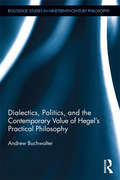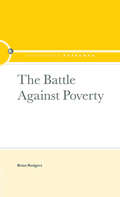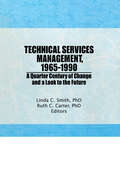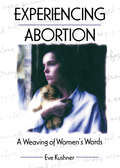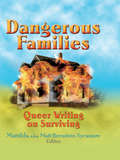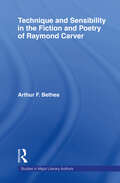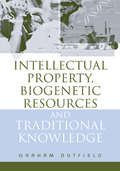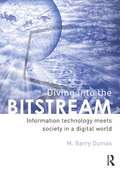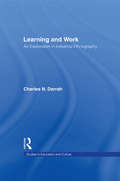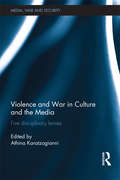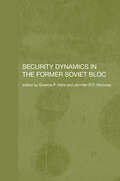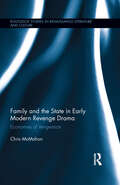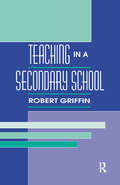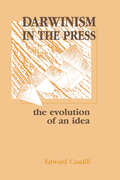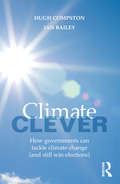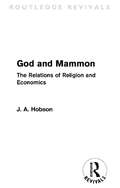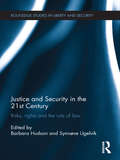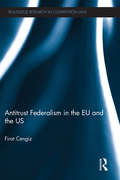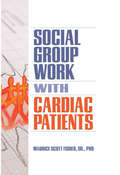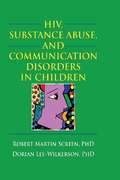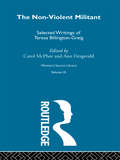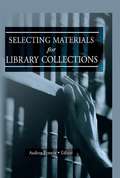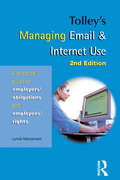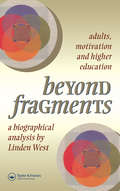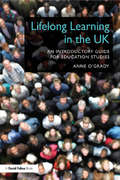Special Collections
Benetech’s Global Certified Accessible Titles
Description: Benetech’s GCA program is the first independent third-party EPUB certification to verify ebook accessibility. By creating content that is born accessible, publishers can meet the needs of all readers. Learn more: https://bornaccessible.benetech.org/
- Table View
- List View
Dialectics, Politics, and the Contemporary Value of Hegel's Practical Philosophy
by Andrew BuchwalterThis book explores and details the actuality (Aktualität) of Hegel’s social and political philosophy--its relevance, topicality, and contemporary validity. It asserts--against the assumptions of those in a wide range of traditions--that Hegel’s thought not only remains relevant to debates in current social and political theory, but is capable of productively enhancing and enriching those debates. The book is divided into three main sections. Part 1 considers the actuality of Hegel’s social and political thought in the context of a constructed dialogues with later social and political theorists, including Marx, Adorno, Habermas, and Rawls. Part 2 explores Hegel’s internal criticism of Enlightenment rationality as well as the unique manner in which his thought reaffirms both the classical tradition of politics and the Christian conception of freedom in order to deepen and further develop our understanding of modernity and modern secularity. Part 3 considers Hegel’s contribution to current theorizing about globalization.
The Battle Against Poverty
by B RodgersFirst Published in 2005. Routledge is an imprint of Taylor & Francis, an informa company.
Technical Services Management, 1965-1990
by Ruth C Carter and Linda C SmithGain an in-depth understanding of changes in technical services that have taken place over a quarter century and look at future trends and changes that may occur. Technical Services Management surveys and analyzes technical services in libraries from 1965 to 1990, a formative period and one of great change in library operations. The book also identifies trends that continue to impact technical services operations in libraries today. Readers gain a comprehensive knowledge of where the field has been and where it is now to help them plan and prepare more effectively for the future.Most chapters are historical, combined with a firm grasp of the present and a glimpse or more at the future. They are grouped to reflect the various aspects of technical services. Trends in technical services are considered in chapters on the development of technical services literature and the major changes in technical services in school libraries. Chapters on the major subdivisions within technical services--acquisitions and collection development, cataloging, and preservation--trace changes in library operations and the impact of automation. Issues in catalog design are explored in chapters on the emergence of online public access catalogs, bibliographic utilities, and approaches to authority control. Efforts to improve subject access are addressed through chapters on subject cataloging, the Dewey Decimal Classification, and indexing in the U.S. and Great Britain. To keep pace with changes in technical services, changes in professional education and development are needed as documented in chapters on cataloging education, continuing education in technical services, and the role of professional organizations. The final chapter outlines new challenges in the future and new roles for librarians in an electronic environment.Effective planning for the future includes learning about the past. Technical Services Management, 1965--1990 is a vital resource for library historians, library educators, technical services librarians, and graduate students in library and information science who need to know “how things were” in order to see more clearly “how things will be.”
Experiencing Abortion
by Eve KushnerIf you&’ve had an abortion and are feeling isolated and vulnerable, Experiencing Abortion will remind you that you are not alone and that you must feel your emotions in order to accept your choice and heal. Each woman responds to abortion in her own way, yet, as this sensitive, insightful book shows, there are many similarities among women&’s post-abortion emotions. Sharing in the firsthand, personal experiences of other women who speak for themselves in this book will help you come to terms with anguish, stress, grief, anger, or any other overwhelming emotions you might be feeling. Don&’t go on ignoring or blocking out your feelings. Learn to incorporate your experience into your sense of self in a healthy way.By reading Experiencing Abortion, you will learn about the multiple feelings and reactions abortion can trigger, the process of accepting an abortion, and the struggle to control fertility without treating your body as an enemy. Offering you a safe, honest, and supportive environment in which to explore your feelings about your abortion, this book discusses many important topics, including: the way moods can overtake you after abortion how avoiding your experience can defer acceptance, which in turn leads to denial and guilt how pregnancy, abortion, and subsequent bleeding can affect your perception of your body the struggle to enjoy sex after your abortion your heightened awareness of gender after an abortion how your intimate relationships may change after an abortion the psychological reasons you may sometimes forgo birth control accepting yourself after a second abortionExperiencing Abortion will help women who have had an abortion understand that it is a complex physical and emotional experience that doesn&’t necessarily end after a week or a month or a year. It will also help professionals in abortion facilities and therapists who offer pre- and post-abortion counseling understand how abortion affects each individual differently and how they might help women work through their feelings both before and after abortion. Partners, friends, and families will find this book helpful and informative as they try to help their loved one get through this sometimes difficult, even traumatic, experience.
Dangerous Families
by Matt Bernstein SycamoreQueer survivors piece together the clues to discover their own lives! Dangerous Families: Queer Writing on Surviving goes beyond the recovery narrative to create a new queer literature of investigation, exploration, and transformation. Twenty-six stories illuminate the reality of growing up in fear, struggling to rebuild lives damaged by sexual, physical, and/or emotional abuse. The book explores how abuse turns queer survivorsmale, female, and transgenderedinto healers, heartbreakers, and homicidal maniacs, presenting brilliant stories that sear and soar. Dangerous Families: Queer Writing on Surviving addresses all forms of abuse head-on, representing a cross-section of queer survivors in terms of race, class, ethnicity, education, origin, sexuality, and gender. Contributors use their own life experiences to create a book that takes back control from well-meaning outsiders, as they recount the daily struggle to overcome the damage done to their minds, bodies, and spirits in a world that denies their gender, sexual, and social identities. From the editor: Dangerous Families consists entirely of writing by survivors of childhood abuse. That's rightno therapists analyzing our plight, no talk-show hosts exploiting usjust survivors, exploring our complicated, frightening, and fulfilling lives. These stories dispense with the usual technique of carefully massaging the reader's fragile worldview before plunging this unsuspecting innocent into a world of horror. They go right to the horror, the beauty, and the joy, often throwing the reader off-guard, revealing layers of meaning before the reader can step back. Dangerous Families: Queer Writing on Surviving is an anthology of 26 true stories of growing up queer in families that magnify the horrors of the outside world instead of offering protection. The book is an essential read for therapists, caseworkers, cultural studies specialists, and anyone struggling to survive childhood abuse.
Technique and Sensibility in the Fiction and Poetry of Raymond Carver
by Arthur F. BetheaA comprehensive examination of the fiction and poetry of Raymond Carver.
Intellectual Property, Biogenetic Resources and Traditional Knowledge
by Graham DutfieldBiogenetic resources - the critical biological and chemical materials that underpin so much of medicine, both modern and traditional, agriculture, and wider economic activity in so many fields - are at the centre of heated debate regarding their use, development, and ownership, and the issues of ethics and equity that impinge on all of these factors. This book is a comprehensive examination of the key issues, institutions and ideologies in this area, presenting definitions and explanations of the fundamentals of intellectual property rights (IPRs), biogenetic resources and traditional knowledge. It uses the insights from this to build a picture of how these factors interact in practice, bringing to the surface issues such as: the conservation and sustainable use of biodiversity, benefit sharing from the commercial use of biodiversity, biotechnological innovation and the transfer of technology, agriculture, food security, rural development, health and international justice. Part 1 describes the relevant international IPR laws, highlights the extent to which modern commerce depends on such resources, and traces the way in which modern IPR law has evolved to accommodate this dependence. Part 2 shows how stronger IPR protection in the area of life science innovation has given rise to controversies such as 'biopiracy', 'terminator' genes and genetic uniformity. Part 3 focuses on traditional knowledge, its nature, its importance, and the applicability of IPR-style protection. Part 4 covers the international negotiation and policy-making of the WTO, WIPO and CBD and the legislative initiatives of national governments of Asia, Africa and Latin America. Finally, Part 5 focuses on two developing country case studies - of India and Kenya - assessing whether they will be able to gain economic benefit from development of their natural resources within the current regulatory system and whether this will encourage the conservation and sustainable use of the resource base. With its multidisciplinary approach and breadth of coverage, this book will appeal both to those new to the subject and to those with professional and specialist interest, including students, academics, legal practitioners, government policy-makers and the private sector.
Diving Into the Bitstream
by Barry M. DumasNationwide, and indeed worldwide, there has been a growing awareness of the importance of access to information. Accordingly, information technology (IT), broadly defined and its role beyond the internal workings of businesses has leapt into the social consciousness. Diving into the Bitstream distinguishes itself by weaving together the concepts and conditions of IT. What distinguishes these trends is their focus on the impacts of IT on societies, and the responsibilities of IT's creators and users. The author pulls together important, often complex issues in the relationships among information, information technologies, and societal constructs. The text explores a synopsis of these issues that are foundations for further consideration.
Learning and Work
by Charles N. DarrahFirst published in 1996. Routledge is an imprint of Taylor & Francis, an informa company.
Violence and War in Culture and the Media
by Athina KaratzogianniThis edited volume examines theoretical and empirical issues relating to violence and war and its implications for media, culture and society. Over the last two decades there has been a proliferation of books, films and art on the subject of violence and war. However, this is the first volume that offers a varied analysis which has wider implications for several disciplines, thus providing the reader with a text that is both multi-faceted and accessible. This book introduces the current debates surrounding this topic through five particular lenses: the historical involves an examination of historical patterns of the communication of violence and war through a variety sources the cultural utilises the cultural studies perspective to engage with issues of violence, visibility and spectatorship the sociological focuses on how terrorism, violence and war are remembered and negotiated in the public sphere the political offers an exploration into the politics of assigning blame for war, the influence of psychology on media actors, and new media political communication issues in relation to the state and the media the gender-studies perspective provides an analysis of violence and war from a gender studies viewpoint. Violence and War in Culture and the Media will be of much interest to students of war and conflict studies, media and communications studies, sociology, security studies and political science.
Security Dynamics in the Former Soviet Bloc
by Jennifer D. P. Moroney and Graeme P. HerdSecurity Dynamics in the Former Soviet Bloc focuses on four former Soviet sub-regions (the Baltic Sea region, the Slavic republics, the Black Sea region, and Central Asia) to explore the degree to which 'democratic security', which includes de-politicisation of, and civilian oversight of, the military, resolution of conflicts by international cooperation, and involvement in international organisations. It examines how far states in these regions have developed cooperative foreign and security policies towards their immediate neighbours and key Western states and organisations, explores the interplay between internal and external aspects of democratic security building, and uses case-study examples to show how inter-state bi-lateral and multi-lateral relations are developing.
Family and the State in Early Modern Revenge Drama
by Chris McMahonIn this book, McMahon considers Early Modern revenge plays from a political science perspective, paying particular attention to the construction of family and state institutions. Plays set for close study are The Spanish Tragedy, Hamlet, The Revenger’s Tragedy, The Malcontent and The Duchess of Malfi. The plays are read as unique events occupying positions in historical process concerning the privatisation of the family (by means of symbolism and concrete household strategies such as budgeting and surveillance) and the subsequent appropriation of the family and its methods by the state. The effect is that family becomes an unofficial organ of the state. This process, however, also involves the reform of the state along lines demanded by the private family. McMahon’s critical method, derived from the theory of Bourdieu, Bataille, and Girard, maps capital transactions to reveal emotionally charged, often idiosyncratic responses to issues of shared concern. Such issues include state corruption, the management of women, the performance of roles according to gender, the uses of surveillance, and the ethics of sacrifice.
Teaching in A Secondary School
by Robert GriffinThis collection of original essays is designed for undergraduate and graduate courses in methods of teaching. While speaking to all the topics covered in traditional methods textbooks, the author also reflects on his own experiences as a student and teacher. He adopts a unique conversational and reflective style that integrates concerns for the well-being of teachers and their professional development, as well as for the role of students in the learning process. Engaging and informed, this book will be a resource for practicing teachers and those in training.
Darwinism in the Press
by Edward CaudillNumerous books and articles have outlined Darwin's impact on American scientists, philosophers, businessmen, and clergy in the 19th and early 20th centuries. Few, however, have undertaken a study of Darwinism in the form in which it was presented to most Americans -- popular newspapers and magazines. The main concern of this book is to identify how the press is treated as a part of our culture - - pointing to its ability to shape and to be shaped by the forces that act on the rest of society and its ability to be critical in the interpretation of ideas for "the masses."
Climate Clever
by Ian Bailey and Hugh CompstonWhy, despite two decades of climate policy, have affluent democracies made so little progress in cutting greenhouse gas emissions? We know that there are ways of doing this that are both practical and affordable. It is politics that is the problem. Stringent climate policies may lead companies to redirect investment elsewhere, or lead voters to retaliate at the ballot box. There are many political obstacles to stronger action. What can be done? Based on an analysis of the logic of policy making, plus observation of recent developments in climate politics, this book identifies a broad range of political strategies that are available to governments that wish to take more effective action against climate change while avoiding serious political damage. Separate chapters deal with strategies relating to unilateral action, persuasion, political exchange, and changing the terms of political exchange. This is the first book-length study of political strategy and climate change and will be of interest not only to policymakers but also to experts and activists looking to formulate politically realistic policy proposals, and scholars and students of politics and environmental studies.
God and Mammon
by J. A. HobsonFirst published in 1931, this is an attempt by the great economist J. A. Hobson to analyse the relations between economics and religion. After considering the origins of the conflicts and compromises between God and Mammon in the life of primitive man, the author concerns himself primarily with medieval and modern Christianity and the business climate and ethos corresponding with these periods. In particular he focuses upon Catholicism and Protestantism, before considering the attitude of the church towards modern economic movements.
Justice and Security in the 21st Century
by Barbara Hudson and Synnøve UgelvikThis book examines the question of whether justice or security is the primary virtue of 21st-century society. The issue of enhancing security without undermining justice – managing risk without undermining the rule of law – has always been problematic. However, recent developments such as new counter-terrorism measures, the expanding scope of criminal law, harsher migration control and an increasingly pronounced concern with public safety, have posed new challenges. The key element of these contemporary challenges is that of membership and exclusion: that is, who is to be included within the community of justice, and against whom is the just community aiming to defend itself? Justice and Security in the 21st Century brings together researchers from various academic disciplines and different countries in order to explore these developments. It attempts to chart the complex landscapes of justice, human rights and the rule of law in an era when such ideals are challenged by increasing demands for efficiency, effectiveness, public safety and security. This edited volume will be of much interest to students of critical legal studies, criminology, critical security studies, human rights, sociology and IR in general.
Antitrust Federalism in the EU and the US
by Firat CengizThe EU and the US are the preeminent examples of multi-level polities and both have highly developed competition policies. Despite these similarities however, recent developments suggest that they are moving in different directions in the area of antitrust federalism. This book examines multi-level governance in competition policy from a comparative perspective. The book analyses how competition laws and authorities of different levels - the federal and the state levels in the US and the national and the supranational levels in the EU - interact with each other. Inspired by the increasingly divergent policy developments taking place on both sides of the Atlantic, the author asks whether the EU and the US can draw policy lessons from each other’s experiences in antitrust federalism. Antitrust Federalism in the EU and the US reveals the similarities and differences between the European and American models of antitrust federalism whilst employing policy network models in its comparative analysis of issues such as opacity and accountability in networks. The book is essentially multidisciplinary in its effort to initiate dialogue between the Law and Political Science literatures in this field. This book will be of particular interest to academics, students and practitioners of Competition Law, Constitutional Law and Political Science.
Social Group Work with Cardiac Patients
by Maurice Scott FisherDevelop a comprehensive understanding of cardiac disease process Cardiovascular problems are on the rise in America. Care providers need to understand the overall clinical and statistical significance these life-changing events have to patients and families alike. Social Group Work with Cardiac Patients is a pragmatic guide that helps social workers and other psychosocial professionals develop and apply cardiac group work in a proactive and directed manner. This valuable text explores social group work with patients immediately recovering from a cardiac eventheart attack or failure, transplants, and implantable cardiac devicesas well the secondary effects of such events. Social Group Work with Cardiac Patients helps social work and healthcare professionals develop a comprehensive understanding of the psychosocial aspect of cardiac care. In addition to examining the correlation between cardiac disease and depression and anxiety, looking at the emotional aspects of heart disease, and providing an overview of social work group care, this unique text details the four core social groupscognitive-behavioral, psychoeducational, skill development, and interpersonal. Both fundamental and state-of-the-art, this comprehensive approach serves to enhance practice skills for immediate and constructive implementation. Important topics discussed in Social Group Work with Cardiac Patients also include: understanding adherence to cardiac health and psychosocial variables suggestions for using basic social groups and their development adherence issues associated with care stress management management of anger among patients holistic affects of cardiac disease on patients and families compliance, follow-up, and follow through substance abuse human sexuality differences between support groups and social group work models group leadership and co-leadership skills and many more! Social Group Work with Cardiac Patients is an asset as a pragmatic, relevant guide for development and actuation of both general social groups and specialty group treatment. An accessible and practical stand-alone text, Social Group Work with Cardiac Patients is ideal for mental health and substance abuse social workers, counselors, cardiac nurse specialists, cardiac treatment staff, and students of social work.
HIV, Substance Abuse, and Communication Disorders in Children
by R. Dennis Shelby and Robert M. ScreenMake sure every child gets a chance to be heardHIV, Substance Abuse and Communication Disorders in Children examines the language problems of young children from special populations. Essential as a textbook for graduate and upper-level undergraduate studies and as a reference resource, this unique book presents up-to-date research and compelling case studies that illustrate how prenatal exposure to drugs, alcohol, and HIV can affect a child in utero and continue to handicap its development after birth. Each chapter includes discussion threads and review questions to promote critical thinking and clinical problem-solving skills in the classroom.HIV, Substance Abuse and Communication Disorders in Children looks at the negative impact a mother&’s lifestyle practices can have on her developing child with a nod toward the significant prevalence of HIV and substance abuse in today&’s society. Some estimates place the number of infants born after prenatal exposure to illicit drugs as three-quarters of a millionevery year. When alcohol is added, the figure rises to more than 1 million. This powerful book focuses specifically on the serious consequences of alcohol, marijuana, cocaine, and crack cocaine abuse, including poor language development and speech delays, limited vocabulary, the inability to make their needs known, poor articulation, the inability to follow commands, limited expressive language skills, and the inability to understand the real meaning of words and generalize them. And of the nearly 5,000 children in the United States living with AIDS, almost all will struggle with speech production and communication disorders as the disease affects their brain, spinal cord, and central nervous system. HIV, Substance Abuse and Communication Disorders in Children examines: the effect of drugs on the brain pregnancy and drug use trends common drugs of abuse Kosakoff&’s syndrome fetal alcohol syndrome (FAS) among Native Americans and African Americans neurologic sequellae speech and language intervention rehabilitation considerations treatment and family counseling and much moreHIV, Substance Abuse and Communication Disorders in Children is essential for graduate and undergraduate students working with language disorders in special populations.
The Non-Violent Militant
by Ann Fitzgerald and Carol McPheeFirst published in 1987. This volume collects together writings of Teresa Billington-Greig, suffragette, activist and political theorist. One of the first organizers for the Women's Social and Political Union, she was a founder-member of the Women's freedom League. She was also the first suffragette to be sent to Holloway Gaol. This volume provides new insights into this exceptional women's lifelong efforts in the woman's movement
Selecting Materials for Library Collections
by Linda S KatzStrategies and tools to help you plan, build, and maintain your library collection! Selecting Materials for Library Collections takes you step-by-step through the process of planning, building, and maintaining a quality library collection. This up-to-date guide addresses the interests and concerns of academic and public libraries with expert advice on budgets, policies, and planning. The book examines print, non-print, and Internet selection resources, including the OCLC WorldCat Database and ACQNET-L. You&’ll find valuable information you can apply right away to help you keep any collection relevant and up-to-date! Selecting Materials for Library Collections provides the tools you need to keep your library collection current. Seasoned experts share their thoughts on how to analyze your users&’ expectations and then provide them with the materials they need. The contributors also examine the selection aids that they use in their own acquisitions work and then look at how to achieve a balanced collection that efficiently serves their clients&’ needs. Supplementary reading lists and extensive bibliographies provide you with additional resources. Selecting Materials for Library Collections presents the latest information on: using print, non-print, and Internet selection resources such as OCLC WorldCat database and ACQNET-L initial collection assessment and decision making collection tool evaluations acquiring international core titles the New Thought movement approval plansset-up, maintenance, and evaluation the newest technology for media selection specialized library collections in music, art, business, economics, health, sports, leisure, and more
Tolley's Managing Email & Internet Use
by Lynda MacdonaldEmail and Internet use is increasingly topical as employers and employees test the boundaries of acceptable use of new communications technology in the workplace. The potential legal liabilities make this a crucial decision-making area for all involved in human resources management.Tolley’s Managing Email and Internet Use will provide you with the essential legal guidance and practical advice to establish, implement and enforce a policy for internet and Email use in your workplace. Tolley’s Managing Email and Internet Use analyses and interprets (in plain language) the law on monitoring employees’ Email and internet activity, the use of confidentiality notices, privacy, harassment and Email interception by employers. It also provides information on the key regulations and guidelines which affect Email and internet policy, including the Human Rights Act 1998, Data Protection Act 1998 and the Regulation of Investigatory Powers Act 2000.Tolley’s Managing Email and Internet Use is the only practical guide to offer you:- strategic guidance on implementing, policing and maintaining an effective Email and internet policy- Current thinking on managing Email and internet use- Sample policies, disclaimers, rules and procedures to assist in establishing your own guidelines- A practical approach featuring questions and answers, checklists and case studies - An accessible read regardless of previous legal experience- Latest case law from recent cases involving Email and internet policyTolley’s Managing Email and Internet Use is a complete reference source for Email and internet policy in the workplace.
Beyond Fragments
by Linden WestAdults now constitute the majority of students in higher education; what they bring to it, want and need are important questions in the development of a more responsive higher education. The author discusses The Relationship Between Motives, Education, And Life History To Explore how culture and history shape people and their motives for learning, taking into account variations in gender, social background and ethnicity, challenging the orthodox view that non-traditional students enter higher educational for vocational/material reasons.
Lifelong Learning in the UK
by Anne O'GradyWritten specifically for Education Studies students, this accessible text offers a clear introduction to lifelong learning and the impact it has on all areas of society. Assuming no prior knowledge of the subject, it explores what lifelong learning is, where learning can and does take place and who is accessing it. Offering a clear overview of the different strands to lifelong learning, the book examines the concept of lifelong learning drawing on key policy initiatives and strategies. Each section outlines the types of individuals who are most likely to access lifelong learning within and across these strands including, for example, migrants, refugees and asylum seekers, unemployed adults, carers and guardians, older age-groups and returning learners. Chapters cover: adult and community learning; higher education; further education; work-based learning; prison and probation learning. Including supporting tasks and reflection activities, this textbook will give students a broad understanding of lifelong learning and its role in supporting adults throughout their life both socially and economically. Lifelong Learning in the UK is an essential introductory text for students on undergraduate courses in Education Studies.
